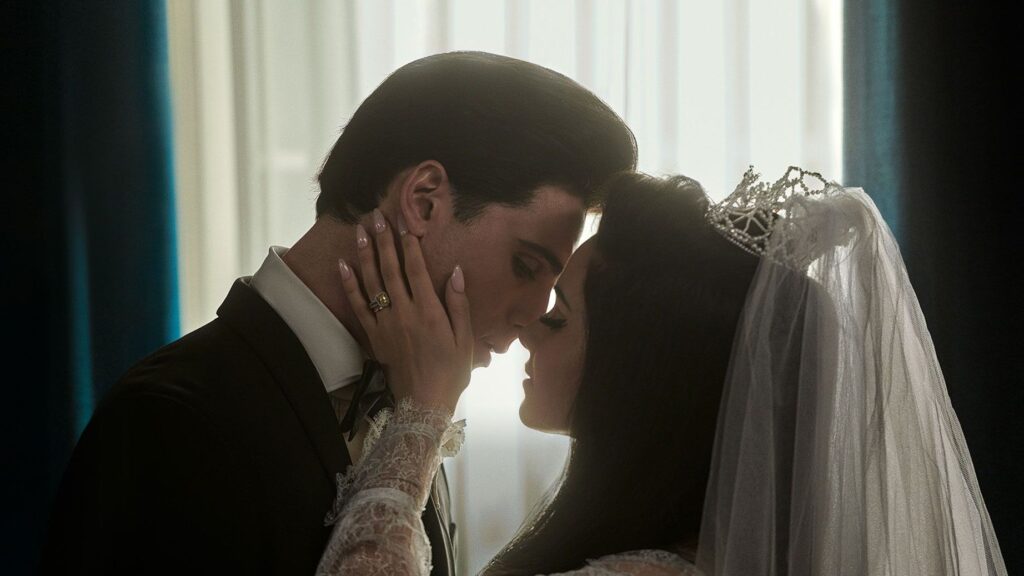Priscilla showcases Sofia Coppola’s uniquely suited talents for its subject matter
Written by Ian Thomas Malone, Posted in Blog, Movie Reviews, Pop Culture
There is no other figure in our country’s culture who embodies the full picture of Americana, all its beauty and its excess, quite like Elvis Presley. The towering heights achieved by the King of Rock and Roll are matched only by his conflicted humanity. Elvis managed to be larger than life and all too human simultaneously, a reality manifested in his courtship of his wife Priscilla from an unprecedented position of power as one of the most sought-after individuals on the face of the earth.
It is quite odd that Elvis, serving in the Army at age twenty-four, took a special interest in a fourteen year old girl barely starting her freshman year of high school. The film Priscilla explores the makings of Priscilla Wagner well outside the typical male gaze through which a woman like her would have been perceived back then. As the daughter of one of the most accomplished directors in the history of cinema, Sofia Coppola knows better than most how the world enjoys projecting its fantasies and shortcomings on any woman bold enough to throw herself out there.
There is a natural proclivity to assign a sort of mystique to Priscilla (played by Cailee Spaeny). Coppola and Spaeny work in tandem to never lose sight of the basic reality of the power unbalance between a young child and one of the biggest celebrities the world has ever seen. One can accept the intentions of Elvis (Jacob Elordi) as genuine and honorable, but there’s no getting around the fact that it is an extremely strange dynamic only made less weird through Presley’s ability to bend any environment to his whim, setting up Priscilla in Memphis with his father and grandmother to watch over her as she finished her studies at a local Catholic school. Trying to do things above board does not make any of this normal.
Coppola delivers a sleek narrative well-suited for her skills, a surface-level reading of a drug-addicted superstar who owes most of his success to the phalanx coddling his every move while safeguarding the means of production. Elordi and Spaeny are mesmerizing together, the former capturing all of Elvis’ charisma while never downplaying his darker tendencies. Spaeny confidently navigates that awkward space between spouse and plaything, forever at the whims of the entire orbit around her. Rarely known for subtlety, Coppola does rather cleverly deploy the Memphis Mafia as a perpetual panopticon that Priscilla is forced to grapple with as she struggles to find her place in Elvis’ life. For a film with practically zero fleshed-out supporting characters, the peanut gallery paints a vivid picture in the absence of any voice of its own.
At 112 minutes, Priscilla is among the longer entries in Coppola’s portfolio, surpassed only by Marie Antoinette, her only other attempt at hovering in the atmosphere of a biopic. It’s hard to argue that she uses the time well, meandering on the same points for most of the narrative while skipping out on the points that would have given her protagonist some agency amidst her broader objective to browbeat the audience into submission regarding the monotonies of Graceland. The third act leaves a lot to be desired, though Coppola does align her film with a broader truth about Elvis that people often forget.
For all the mystique surrounding Elvis, the man himself is not terribly complicated. Elvis possessed unparalleled charisma, but the presence of Colonel Tom Parker, who never appears in the film, took raw talent and transformed it into an industry. The man was a drug addict who spent much of his career coasting off the fame acquired in his youth, already on the downturn by the time a fourteen-year-old Priscilla came into his life. Elvis is every bit the commodity that Graceland itself became after his death. He undoubtedly loved Priscilla, while gradually using his star power to control and abuse any sense of agency she might have felt. Love is complicated. Elvis Presley is not. For all its flaws, Priscilla understood that innate truth better than most.











